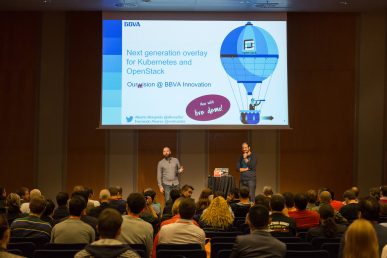Monica Rodriguez is a technical team lead with Chemical Abstract Service (CAS), a division of the American Chemical Society. She’s also a Certified OpenStack Administrator and a member of Women of OpenStack.
She’s presenting two sessions at the OpenStack Summit Boston, May 8-11, where she will be recounting the triumphs and trials of her work.
Rodriguez tells Superuser more about CAS, the role OpenStack plays in its day-to-day operations, how becoming OpenStack certified has impacted her career and what to expect from her talks at the Summit.
What is your role at the CAS?
I’m a technical team lead for our operations platform, a DevOps organization. Our primary focus is to provide fundamental capabilities that enable rapid, flexible construction and delivery of new products and services.
How has becoming a Certified OpenStack Administrator (COA) impacted your career?
I became a COA about five months after I started working with OpenStack. This was my first involvement with open source technology, DevOps and the world of open source technology. Taking the exam was a major stepping stone for me to show that I had reached a verifiable level of expertise in the field. The COA not only boosted my confidence but also provided a jumping-off point that allowed me to dive deeper into the technology that facilitates CAS’s ability to rapidly advance scientific discovery.
Tell us about your organization and its customers.
CAS, a division of the American Chemical Society, provides a variety of solutions that support science, engineering, technology, patents, business information and much more across a variety of scientific disciplines. CAS scientists and technologists ensure connections among published scientific data that are unparalleled. Our products and services are designed to accommodate a wide range of information needs, whether you are a student, an infrequent researcher who only needs a few quick answers or a business professional who requires more powerful and comprehensive analyses.
How long has CAS been using OpenStack and in what capacity?
CAS has been using OpenStack for about two years to support our product development initiatives. We have migrated existing products to the cloud environment and are continuously deploying new ones. We have a handful of deployments in production at this time and expect to increase this rapidly going forward.
What will people learn from your presentations?
For “A Series of Unfortunate Deployments”, I’ll be presenting alongside my colleague Scott Coplin and Chris Breu, private cloud architect at Rackspace. We’ll be sharing the story of our team’s efforts deploying a Lambda architecture search engine on OpenStack, showcasing the trials and tribulations we encountered on our journey. We share what worked for us and what didn’t, including how taking advantage of all that Nova compute offers made this deployment a success. We also highlight the importance of the OpenStack operators working closely with developers to ensure maximize performance and stability. OpenStack is excellent for all things, but best when both devs and operators tailor the environment to match the expected workloads.
I’ll also be presenting a lightning talk “Deploy It Like You Mean It: Committing to Continuous Delivery with Jenkins Pipeline in OpenStack.” As a DevOps engineer, I’m constantly looking for ways to improve our workflows through efficiency and automation. It’s been so exciting to see how something that was already good can be made great! I’m looking forward to sharing that at the Summit.
What’s next for your organization?
We plan to expand our OpenStack usage in both functionality and number of products deployed on OpenStack. As an established organization, we have many legacy applications that can be difficult to migrate. With increased knowledge of OpenStack and the functionality available, we can utilize it further. Our goal is to make three to five new applications available to our customers within the next year.
- Demystifying Confidential Containers with a Live Kata Containers Demo - July 13, 2023
- OpenInfra Summit Vancouver Recap: 50 things You Need to Know - June 16, 2023
- Congratulations to the 2023 Superuser Awards Winner: Bloomberg - June 13, 2023

)










